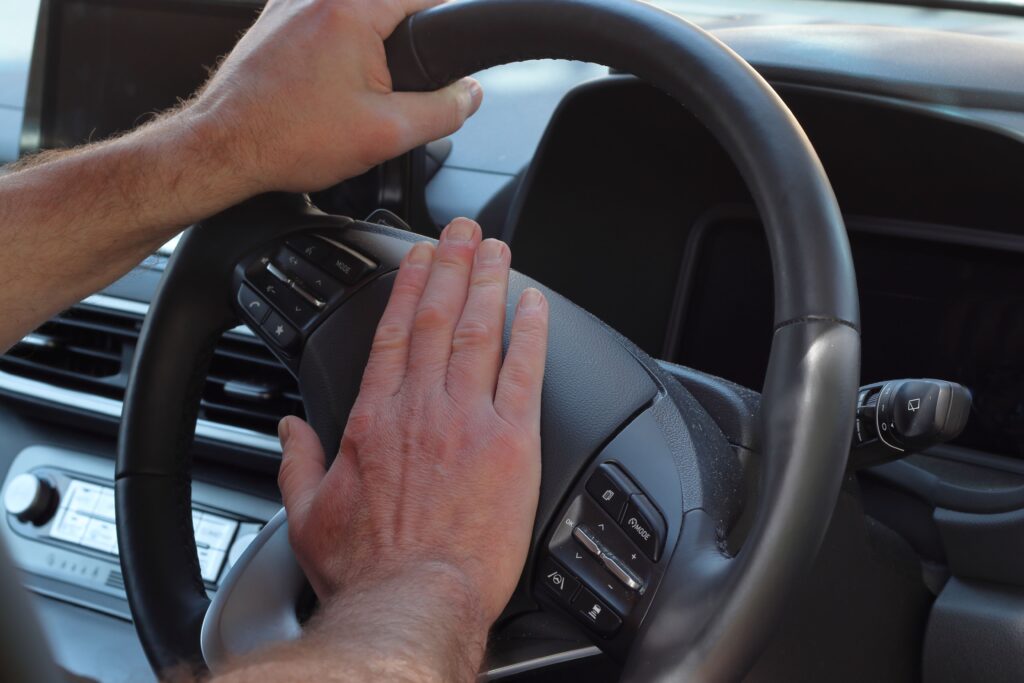Road Rage and The Impact on Truck Drivers
Road rage, my fellow truckers, is not just a term we hear tossed around casually. It’s a real issue that affects us every day as we navigate the highways and byways of this vast country.
But what exactly is road rage? Well, it’s that intense anger or aggression that surges within us when we’re faced with frustrating driving situations.
It manifests in behaviors like tailgating, honking aggressively, or even engaging in verbal altercations with other drivers. Now, you might wonder how road rage specifically impacts us truckers.
Let me tell you, my friends; it’s no walk in the park. As professional drivers, our livelihood depends on our ability to transport goods efficiently and safely across thousands of miles.
But when road rage consumes us behind the wheel, it can have severe consequences. Not only does it compromise our own safety but also jeopardizes the lives of other motorists sharing the road with us.
Addressing Road Rage for the Safety and Well-being of Truckers
Addressing road rage is not merely an option; it’s an imperative for us truckers who spend hours upon hours on the road each day. The stakes are high, my friends – so high that maintaining control over our emotions becomes paramount to ensuring both our safety and well-being.
Imagine this: You’re cruising down a busy interstate with a tight delivery deadline looming ahead. Traffic unexpectedly slows down to a crawl due to some accident up ahead.
The frustration builds within you like steam in a pressure cooker – your palms get sweaty, your heart races faster than an F1 car at full throttle. But here lies the danger: when anger takes over reason, accidents become more likely to occur.
Uncontrolled aggression can lead to rash decisions like tailgating or attempting risky maneuvers to save a few precious minutes. These split-second choices can have catastrophic consequences not only for us but for innocent bystanders as well.
By addressing road rage head-on, we are prioritizing our own safety and the safety of others. We’re acknowledging that managing our emotions behind the wheel is just as crucial as maintaining a well-functioning engine or checking our tire pressure regularly.
It is an investment in our personal and professional lives, ensuring that we can continue to do what we love without compromising anyone’s well-being. So, my fellow truckers, let us embark on this journey together – learning how to tame the beast within us when frustration strikes on the open road.
Stay tuned as we explore strategies and techniques specifically tailored to combat road rage as truck drivers. Together, we will create safer highways and pave the way for a more harmonious driving experience for all.
Understanding the Causes of Road Rage

Stress Factors Specific to Truckers
Life on the road can be demanding and exhausting for truckers. The long hours spent driving, often with minimal breaks, can take a toll on their physical and mental well-being. Truckers face tight deadlines imposed by their employers or clients, leaving them with little room for error or delays.
The pressure to deliver goods on time adds an extra layer of stress to an already demanding job. Moreover, the constant need to meet strict delivery schedules and adhere to complex logistics can lead to heightened tension and anxiety.
External Triggers
Truckers encounter various external triggers that may contribute to road rage. Dealing with aggressive drivers is a common challenge; some motorists seem determined to cut off trucks or tailgate them relentlessly.
Additionally, the frustration caused by heavy traffic congestion cannot be underestimated. Sitting bumper-to-bumper for hours on end tests the patience of even the calmest trucker.
Navigating through congested urban areas can be particularly challenging due to narrow streets and impatient drivers who fail to understand the limitations of large trucks. These external factors can escalate stress levels quickly and trigger intense emotions within truckers.
Internal Factors
Internal factors play a significant role in road rage experienced by truckers. Personal frustrations accumulated over time can intensify their reactions towards other drivers on the road.
Long periods away from home and loved ones may exacerbate feelings of loneliness or dissatisfaction. Fatigue is also a major internal factor influencing road rage among truckers.
Being behind the wheel for extended periods without adequate rest breaks increases tiredness and diminishes alertness. Fatigue impairs decision-making abilities and reduces patience levels when dealing with challenging driving situations.
It is crucial for truckers to recognize and address their own fatigue before it escalates into a dangerous situation on the road. It’s vital to understand that the causes of road rage for truckers are multifaceted, stemming from both external and internal factors.
By recognizing these triggers, truckers can take proactive steps to mitigate them and maintain a calm and composed demeanor while on the road. In the following sections, we will explore effective strategies to manage road rage and ensure safer journeys for everyone.
Managing Road Rage on the Road

Maintaining a Calm Mindset
When it comes to dealing with road rage, one of the most effective ways for truckers to stay calm and composed is by practicing relaxation techniques. Deep breathing exercises can work wonders in reducing stress and anger. Simply take a deep breath in through your nose, hold it for a few seconds, and exhale slowly through your mouth.
Repeat this several times, focusing on each breath and allowing yourself to let go of any tension or frustration. Visualization is another powerful tool; imagine yourself in a peaceful setting, such as a serene beach or a tranquil forest, where you can detach from the chaotic road and find inner calm.
Utilizing Positive Self-Talk to Reduce Anger and Frustration
The power of positive self-talk should not be underestimated when it comes to managing road rage. Instead of letting negative thoughts spiral out of control, consciously replace them with positive affirmations.
Remind yourself that you are in control of your emotions and that reacting aggressively will only escalate the situation. Repeat phrases like “I choose peace over anger” or “I am focused on safety and staying calm.” By shifting your mindset towards positivity, you can diffuse feelings of anger and frustration before they consume you.
Listening to Calming Music or Audiobooks during Long Drives
Long drives can be monotonous and contribute to feelings of irritability or restlessness for truckers. One effective way to combat these emotions is by creating an atmosphere of tranquility through calming music or engaging audiobooks.
Compile a playlist consisting of soothing tunes that help alleviate stress levels. Instrumental melodies, classical compositions, or nature sounds can work wonders in promoting relaxation while driving.
Moreover, audiobooks are an excellent way to escape the current situation and immerse yourself in another world. Choose genres that captivate your interest or provide valuable insights, allowing you to shift your focus away from any potential road rage triggers.
By incorporating these practices into your routine, managing road rage becomes an easier task. Remember that maintaining a calm mindset is crucial for your own well-being and the safety of everyone on the road.
With relaxation techniques like deep breathing and visualization, positive self-talk to combat negativity, and the assistance of calming music or captivating audiobooks, you can effectively navigate the highways with a sense of peace and serenity. Stay tuned for the next section, where we explore effective communication strategies to further diffuse tense situations on the road.
Effective Communication Strategies
Using Non-Verbal Cues to Defuse Tense Situations

When faced with a tense situation on the road, truckers can rely on non-verbal cues to communicate their intentions and defuse potential conflicts.
Simple gestures like using hand signals or making eye contact can work wonders in conveying messages without escalating tensions further. For instance, a friendly wave or nod can indicate gratitude for allowing them to merge into traffic or apologize for an unintentional mistake.
Furthermore, maintaining a relaxed posture while driving can signal calmness and discourage aggressive behaviors from other drivers. Sitting upright with hands firmly on the steering wheel showcases confidence and control, subtly sending a message that aggression is unnecessary and unwelcome.
Avoiding Aggressive Behavior

It’s essential for truckers to resist engaging in any form of aggressive behavior that may exacerbate road rage situations. This includes avoiding tailgating — giving sufficient space between your truck and the vehicle ahead not only prevents accidents but also discourages confrontations with aggressive drivers.
Remember, maintaining a safe distance allows for better reaction time in case of sudden stops or emergencies. Additionally, excessive honking should be avoided whenever possible.
Honking should only be used as a warning signal in critical situations, such as potential collisions or alerting unaware pedestrians. Unnecessary honking tends to escalate tensions rather than resolve them.
Practicing Empathy and Understanding

Empathy is crucial when dealing with road rage incidents as it helps foster understanding between drivers who may have different perspectives and emotions during their journeys. Instead of assuming ill intentions behind someone else’s actions, truckers should strive to consider alternative explanations before reacting defensively.
By acknowledging that everyone on the road has their own set of circumstances and pressures, truckers can approach potentially aggressive drivers with empathy. Perhaps that driver who cut you off is rushing to a hospital for an emergency, or maybe they made an honest mistake due to distractions.
Taking a moment to reflect on these possibilities can diffuse anger and promote understanding. Ultimately, effective communication strategies serve as valuable tools for truckers to navigate the challenging realm of road rage.
Utilizing non-verbal cues, avoiding aggressive behavior, and practicing empathy can create safer environments for all drivers on the road. Remember that fostering goodwill and cooperation can make even the most stressful situations more manageable and less likely to escalate into something dangerous.
Techniques for Dealing with Aggressive Drivers

Keeping a Safe Distance from Aggressive Drivers
When encountering an aggressive driver on the road, it’s essential for truckers to prioritize their safety and avoid any unnecessary confrontations. The first step is to maintain a safe distance from the aggressive driver, allowing ample space between your truck and their vehicle.
This distance grants you more time to react if their behavior escalates. Remember, it’s never worth risking your well-being or the safety of others by retaliating or engaging in road rage.
Reporting Dangerous Behavior
If you witness an aggressive driver exhibiting highly dangerous or reckless behavior, it is crucial to report it promptly. By doing so, you play an active role in ensuring safer roads for everyone.
When reporting, gather as much information as possible about the incident, including accurate details like license plate numbers and vehicle descriptions. This information helps authorities track down the offender effectively.
Utilizing smartphone apps or dedicated hotlines for reporting incidents With modern technology at our fingertips, smartphone apps have become valuable tools for reporting road incidents instantly.
Many states have specific apps that allow you to report dangerous driving behaviors directly from your mobile device. Additionally, dedicated hotlines are also available across different regions solely designed for reporting incidents on the road swiftly.
Enhancing Safety Measures on the Road
Enhancing safety measures on the road goes beyond managing aggressive drivers; it involves implementing proactive strategies to mitigate potential risks. Here are some additional measures truckers can adopt:
- Regularly inspecting their vehicles before each trip.
- Adhering strictly to speed limits and traffic regulations.
- Avoiding distracted driving by refraining from using mobile devices while driving.
- Staying alert by taking regular breaks during long journeys.
- Keeping up-to-date with weather forecasts to prepare for adverse conditions.
By prioritizing safety at all times, not only are you protecting yourself but also contributing towards creating a safer environment for all road users.
Conclusion
Navigating road rage incidents and managing stress factors unique to truckers require patience, self-awareness, and proactive measures. By implementing techniques like keeping a safe distance from aggressive drivers, reporting dangerous behavior when necessary, and creating a healthy work-life balance, tuckers can enhance their overall well-being and safety on the road.
Remember, seeking support from fellow truckers or professional counseling is never a sign of weakness but rather a strength in acknowledging one’s mental health needs. By prioritizing safety measures and embracing these strategies, truckers can contribute to a more harmonious and stress-free driving experience for themselves and others on the road.










